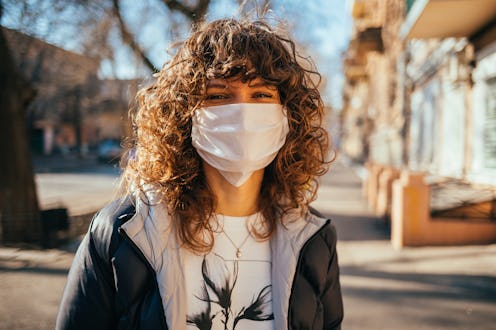Health
What To Do If You Feel Faint While Wearing A Face Mask
It may no longer be a legal requirement, but wearing a mask still comes recommended.

In 2021, wearing a mask or facial covering in enclosed spaces has become the norm. Still, as of July 19, the UK government announced that there was no longer a legal requirement to wear masks, but that they “expect and recommend” the public to wear one in spaces such as public transport. Despite the rule changes, businesses such as airlines and airports still require passengers to wear face coverings. Yet masks can be uncomfortable to wear, so it’s understandable that some may be wondering what to do if wearing a mask makes you feel faint or short of breath.
While the weather may be getting cooler, which makes wearing a mask a little more comfortable than in the heat, many still find masks can make them feel faint over prolonged periods. As Dr. Hideki Taniguchi, a dehydration specialist, told the Financial Times back in 2020: "[Wearing a mask] stops cool air coming in, which raises the temperature especially above the neck; it retains humidity, so the throat becomes dry and people forget to drink."
Despite this, forgoing masks entirely is not an option those who still want to wear a mask in crowded environments. For those who aren’t medically exempt, but find wearing a mask uncomfortable, there are ways to make the experience feel more manageable.
Opt For Breathable Materials
Luckily, it’s now relatively easy to purchase various styles of masks online or in stores. But, if you’re concerned about whether wearing a mask can make you feel dizzy, it’s worth checking out what your mask is made out of.
It’s best to avoid synthetic fabrics, and instead choose a face-covering that’s made out of breathable fabric, such as 100% cotton. Nicole Jochym, a third-year medical student who works with the Sew Face Masks Philadelphia organisation, spoke to the Insider back in 2020 about the subject. She recommended avoiding masks with filters, as they are frequently made from synthetic materials, which are less breathable.
For those with existing breathing issues, such as asthma, it’s worth noting advice from charity Asthma UK. They don’t recommend a specific face covering, however, they do suggest you try out a few different types to find one that’s comfortable.
For those who want to make their own face masks, the UK government has released a guide to making and wearing face-coverings. Alternatively, Bustle has put together a list of independent brands selling face masks in the UK to help you buy a face covering in a responsible way.
Make Sure It Fits
You aren’t alone if wearing a mask makes you feel uncomfortable. Even doctors admit to struggling with breathing when wearing one. "A tight mask on your face can make anyone have trouble breathing. I even get it when I'm treating my patients," Dr. Purvi Parikh, M.D., an immunology and infectious disease specialist at New York University, told Mail Online last summer.
To help, the World Health Organisation suggests trying on your mask as if you were choosing a hat or pair of glasses, and picking a mask that fits your face shape, and allows you to breathe with ease.
The fit of your mask is not only important for being able to breathe easily. It's also crucial to help prevent the spread of the virus. As WHO states: “If it doesn’t fit, it doesn’t work”. The official advice is that masks should entirely cover your nose and mouth, leaving no gaps. If you find your elastic ear straps tight, try face masks with adjustable string ties.
Carry Extras If Available
If you anticipate wearing a mask for a prolonged period (such as travel, or in a place of work) you may find changing it often could be helpful. "Because cotton masks will absorb sweat when you wear them, it is important to have several clean ones available to use," shares the Inquirer. Using a safe mask-removal technique, switch up masks in private areas, and depose of them safely. Following the overnment's advice, make sure to always wash your hands when removing a mask.
Limit How Long You Wear One
Per UK government advice, members of the public are still encouraged to wear masks on public transport, in supermarkets, while at work, and in other enclosed spaces. Yet as explained in the Inquirer, there are situations – like driving alone in your car or walking around outside – where you won't need a mask, so long as you're taking hygiene precautions, and practicing social distancing, you can limit your need to wear a mask by keeping trips to enclosed public spaces as short as possible.
This article was originally published on